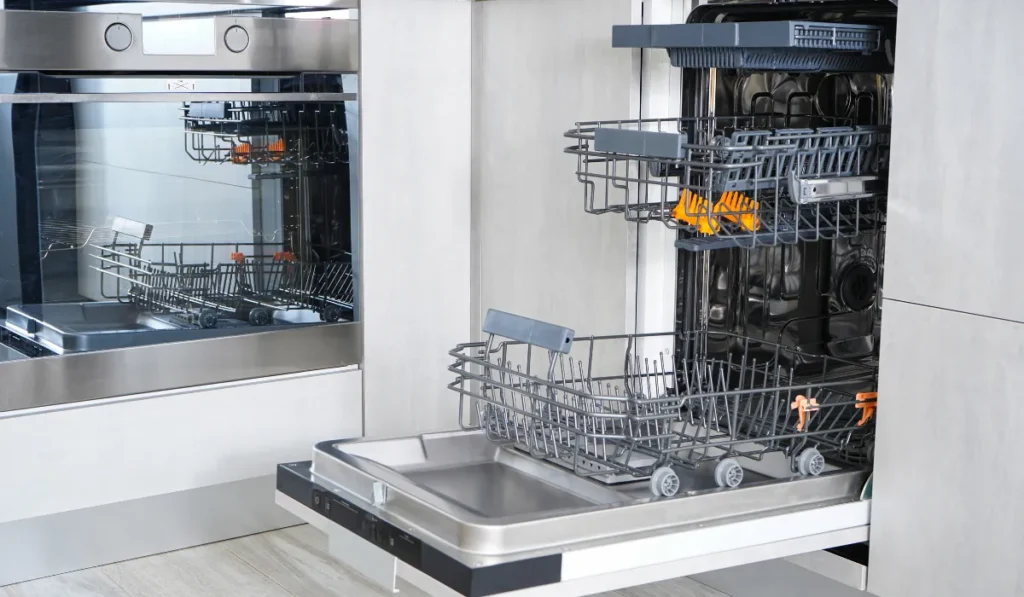What Does Dishwasher Safe Mean? Unveiling the Truth
‘Dishwasher safe’ indicates that a product can be cleaned in a dishwasher without damage. It withstands the machine’s heat, water pressure, and detergents. Items not labeled as such may warp, crack, or degrade. Always check the manufacturer’s guidelines for dishwasher safety.
Understanding Dishwasher Safe Labels

Definition of Dishwasher Safe
When we say an item is dishwasher safe, we mean that it can go through the cycles of a dishwasher without being damaged.
This term assures you that the heat, water pressure, and detergents inside a dishwasher will not harm the product. It’s a promise of durability and ease of cleaning for your kitchenware.
Different Symbols and Their Meanings
Dishwasher safe symbols can appear as simple text or pictograms. These symbols usually feature a dish beneath water droplets or inside a square box, indicating that the item can be washed in a dishwasher.
Sometimes, the manufacturer might include specific instructions, like the top rack only, to guide you on the best dishwashing practices for that item.
Variations in Dishwasher Safe Labels Across Different Countries and Manufacturers
Dishwasher safe labels can vary worldwide, as there is no universal standard. In Europe, for example, the labels may adhere to EU regulations, while the U.S. may have different compliance standards.
Manufacturers also have their own unique symbols, so it’s essential to familiarize yourself with the specific icons for each brand.
Importance of Following Manufacturer’s Guidelines
To avoid damage to your items, it is crucial to follow the guidelines provided by the manufacturer. These instructions are tailored to the product’s design and material, ensuring that your items remain in top condition after each wash.
Ignoring these recommendations can lead to premature wear, discoloration, or deformation of your kitchenware.
Factors That Determine Dishwasher Safety

Material Composition
The type of material an item is made from plays a significant role in its dishwasher safety. Glass and ceramic are generally safe, while plastics vary depending on their grade.
Metals like stainless steel are typically fine, whereas aluminum may suffer corrosion. It’s essential to know the material composition of your items to determine their suitability for dishwasher use.
Temperature Tolerance and Dishwasher Heating Elements
Dishwashers use high temperatures to clean and sometimes to dry items. Not all materials can withstand such heat.
For instance, certain plastic containers might melt or warp. Understanding the temperature tolerance of your kitchenware is vital to maintain its shape and function.
Chemical Resistance to Dishwasher Detergents
Dishwasher detergents can be harsh, with chemicals designed to break down food and grease.
Materials that are not chemically resistant may degrade over time. This is particularly true for some plastics and non-stick coatings that can wear away with repeated exposure to these detergents.
Impact of Water Pressure and Dish Placement
Water pressure within dishwashers can be intense, and how you place your dishes can affect their safety.
Items placed in vulnerable positions may be more likely to chip or break. It’s important to consider the placement of your items to ensure they are not damaged by the force of the water jets.
Tips for Preserving Dishwasher Safe Items

Pre-rinsing and the Debate Over Its Necessity
Some people swear by pre-rinsing dishes before placing them in the dishwasher, while others find it unnecessary.
Modern dishwashers are designed to handle food residue, but pre-rinsing can prevent food particles from sticking to your items during the wash cycle.
Recommended Dishwasher Settings for Various Materials
Using the right dishwasher settings for different materials can enhance cleaning results and protect your items.
For example, a gentle cycle is better for delicate glassware, while a more robust cycle can be used for stainless steel pots and pans. Consult your dishwasher manual to understand the best settings for each type of kitchenware.
Loading Strategies for Optimal Cleaning and Safety
How you load your dishwasher impacts both the cleaning effectiveness and the safety of your items.
Place heavier items on the bottom rack and lighter, more delicate ones on the top. Ensure that dishes do not touch each other to avoid breakage and to allow water to circulate properly.
Maintenance of Dishwasher Safe Items to Ensure Longevity
Regular maintenance of your dishwasher safe items can extend their lifespan. This includes checking for any chips or cracks and avoiding the use of abrasive cleaners that can scratch surfaces.
Proper maintenance keeps your items looking new and functioning well for years.
When to Hand Wash Items Labeled as Dishwasher Safe
Even items labeled as dishwasher safe might benefit from occasional hand washing.
This is particularly true for items with adhesive components, intricate designs, or those that are prone to dulling over time. Hand washing can sometimes be the gentler choice for preserving the quality of your kitchenware.
FAQs About Dishwasher Safe
What does ‘dishwasher safe’ mean on a product?
‘Dishwasher safe’ means that a product can be cleaned in a dishwasher without suffering any damage from the heat, water pressure, or detergents used in the machine.
How can I tell if an item is dishwasher safe?
You can tell if an item is dishwasher safe by looking for a label or symbol on the product or by checking the manufacturer’s guidelines.
What might happen to items that are not dishwasher safe?
Items that are not dishwasher safe may warp, crack, melt, or degrade when exposed to the conditions inside a dishwasher.
Can all dishwasher safe items be placed in any section of the dishwasher?
No, even if items are dishwasher safe, the manufacturer’s guidelines may recommend placing them in specific sections of the dishwasher for best results and to prevent damage.
Are there any materials that are generally considered not dishwasher safe?
Yes, materials such as certain plastics, wood, delicate glass, hand-painted ceramics, and cast iron are generally not dishwasher safe.
Final Thoughts
‘Dishwasher safe’ signifies a product’s ability to endure the harsh environment inside a dishwasher without sustaining damage, such as warping or cracking.
This resilience includes tolerating high temperatures, water pressure, and cleaning agents. It is crucial to consult the manufacturer’s guidelines to confirm the dishwasher safety of any item.





